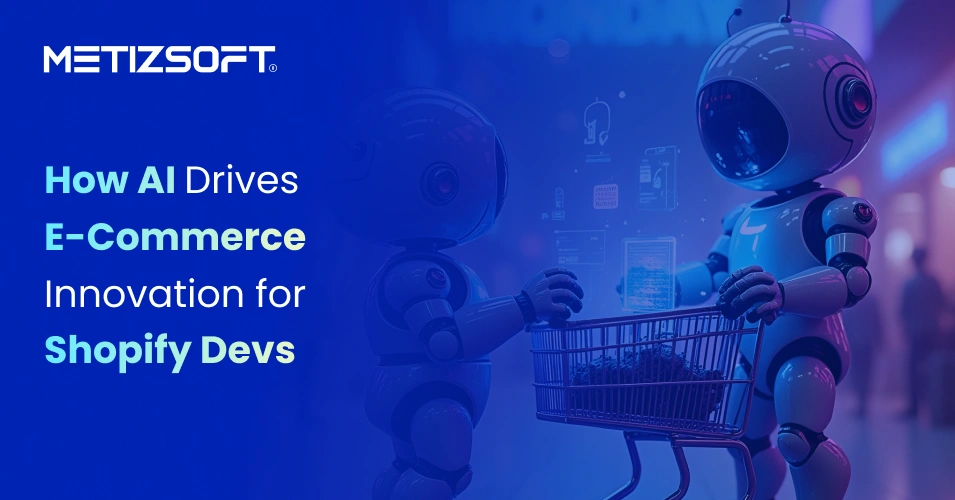
Table of Contents
Summary
AI is providing Shopify developers with powerful tools to create more innovative, more personalized online shopping experiences. By utilizing AI tools such as tailored product suggestions, intelligent chatbots, and predictive analytics, businesses can enhance their sales, keep customers more engaged, and manage their inventory more efficiently. This whitepaper provides a closer look at the fundamentals of AI, what Shopify offers in this area, how to put these AI features into practical use, offers some tips for advanced integration, and highlights the ethical aspects to consider.
Introduction
AI has truly revolutionized online retail and its impact is especially pronounced on robust platforms like Shopify. For developers building Shopify stores, AI is no longer a distant future idea; it’s a must-have toolkit for today. This technology enables the creation of shopping experiences that are more engaging, interactive, and tailored to each customer, fostering loyalty and encouraging repeat business.
At Metizsoft, we believe in empowering our developer community. Hence, we prioritize building the skills needed in this evolving landscape. This whitepaper synthesizes the key information you need to know about AI in Shopify development, from foundational concepts to practical implementations and ethical best practices.
When Shopify developers truly understand and effectively utilize AI, they can discover new ways to generate revenue, reduce cart abandonment, and automate routine tasks. This all adds up to genuine innovation in the world of e-commerce.
AI Fundamentals for E-Commerce: Breaking Down the Basics
Before we explore the specific AI tools available in Shopify, it helps to grasp the main types of AI that drive today’s e-commerce features:
Machine Learning (ML): ML enables computers to learn from data without explicit programming. In a Shopify store, ML can analyze customer purchases and browsing behavior to suggest products customers are likely to buy next. This “learning” improves over time with more data, making recommendations more innovative and more tailored.
Natural Language Processing (NLP): NLP is the type of AI that understands human language, spoken or typed. It powers smarter search bars and AI chatbots, allowing them to interpret vague or conversational queries. For example, a customer typing “warm jackets under $100” can get accurate search results with the help of NLP.
Computer Vision: Computer vision enables AI to understand and analyze images. This particular technology is what powers visual search capabilities. How can customers upload a photo of something they like, and the system finds matching or similar items from the Shopify catalog? That’s this AI at work.
Real-World AI Success Stories on Shopify
Brooklinen saw its sales jump after implementing AI-powered intelligent recommendations which also helped boost the average amount customers spent.
Rebecca Minkoff created a virtual assistant chatbot to guide shoppers through their site, which successfully lowered the number of visitors leaving quickly.
Snow Teeth Whitening utilized AI to automatically organize and feature customer content, reducing manual work and making their site feel more authentic.
These case studies highlight how profoundly AI can impact things when used intelligently and with careful consideration.
Shopify AI Tools and APIs: Releasing Powerful Features
The leading eCommerce platform offers a range of AI tools and APIs designed to simplify the incorporation of AI for both developers and merchants.
Shopify Magic and Built-in AI Features
Shopify Magic enables automatic product recommendations, AI-driven search enhancements, and chatbots, all built directly into the Shopify platform for seamless deployment.
The Product Recommendations API enables developers to display “related products,” “frequently bought together,” and “trending products” blocks, thereby increasing cross-selling and upselling opportunities.
Security Best Practices
When you’re working with AI APIs, you need to keep security tight:
Always keep your API keys secure on the server side; don’t include them in code that runs in the user’s browser.
Use environment variables and secure app proxies to guard those keys and any other sensitive information.
Set up rate limiting to stop the service from getting overloaded or misused.
Planning Your AI Feature
An effective AI integration starts with precise planning:
Choose your goal: What problem are you solving? Example: “Help customers find products faster with an AI-powered product finder.”
Select tools: Shopify APIs, OpenAI for natural language processing, and Algolia for intelligent search.
Design frontend integration: Use Shopify Liquid templates and JavaScript for smooth user interaction.
Build secure backend services: This will help streamline interaction with AI APIs and handle fallback logic if services fail.
Test and iterate: Utilize A/B testing and user feedback to refine AI behavior for maximum impact.
Popular AI-Enhanced Search Tools
Algolia offers advanced AI search with typo tolerance, natural language processing, and real-time personalization.
Searchspring and Doofinder also offer robust AI search solutions that are compatible with Shopify stores.
Shopify’s native Search & Discovery app offers basic AI-driven features but can be extended with third-party APIs.
Best practices for AI search include utilizing autocomplete suggestions, training the AI on actual customer queries, and continuously refining it through usage data.
AI-Powered Customer Experiences: Personalized & Smart
Chatbots and Messaging Automation
Many Shopify stores enhance customer service with AI chatbots:
Shopify Inbox provides basic automation integrated with Shopify messaging.
Platforms like Tidio and Gorgias offer more advanced AI chatbot features.
For full customization, developers can utilize OpenAI’s GPT APIs to facilitate natural conversations that address pre-sales questions and provide product guidance.
Visual Search: A New Way to Shop
Visual search enables shoppers to upload an image and instantly find similar products, enhancing discovery and satisfaction. This is especially useful for categories where style, color, and design matter.
Personalization Techniques
Using AI, stores can personalize multiple touchpoints to boost sales and loyalty:
Behavior-based recommendations based on browsing, cart, and purchase history.
Customer segmentation with AI clustering to tailor marketing efforts (e.g., new vs. returning customers, high spenders).
Personalized email campaigns with AI-crafted subject lines and content that adapt dynamically based on user activity.
Customized homepage banners and location-based offers that make each visit feel unique.
Testing and Optimization
A/B testing lets you compare AI-powered features with control groups to measure impact on:
- Conversion rate
- Bounce rate
- Average order value
- Time spent on site
Use these metrics to fine-tune AI models and UX design.
UX Best Practices for AI Features
Transparency: Explain why a product was recommended (e.g., “Because you viewed X, here’s Y”).
Performance: Keep AI responses snappy with loading indicators where necessary.
Control: Allow users to adjust filter criteria or provide feedback to improve AI results.
Feedback Loops: Collect user ratings to improve recommendations and search accuracy continuously.
How Advanced AI Shapes Prediction, Apps & Ethics
Predictive Analytics for Inventory and Demand: Prevent stockouts and overstocking by leveraging AI to forecast demand accurately. Analyze past sales data, along with external factors such as holidays and weather, to make smarter inventory decisions. This reduces waste and lost sales.
AI-Powered App Features
Utilize OpenAI APIs to automatically generate SEO-friendly product descriptions, saving time and boosting traffic.
Implement innovative reply systems that suggest customer inquiry responses for quicker support.
Train machine learning models to predict product demand or customer churn, enabling proactive business strategies.
Utilize AI to summarize lengthy product reviews or blog posts, enhancing content accessibility.
Segmenting Customers and Selecting Who to Reach: AI can identify distinct customer groups by analyzing their online behavior, personal details, and purchasing preferences. This helps create marketing efforts and tailor product recommendations that connect with shoppers.
Ethical AI Use in E-Commerce
Building trust is critical when deploying AI:
Obtain clear, explicit user consent for data collection and AI use.
Be transparent about how AI influences recommendations, search results, or chat interactions.
Work actively to prevent bias by training AI models on diverse datasets and regularly auditing them for fairness and accuracy.
Minimize data collection to what is strictly necessary and anonymize data where possible.
Keep humans in the loop for sensitive decisions, such as fraud detection or order blocking, to ensure transparency and accountability.
Implement fail-safes to ensure AI errors don’t harm customers or business operations.
The Future of Shopify Development Is Smart
Artificial intelligence is no longer just a passing trend; it has become essential for building cutting-edge, customer-focused Shopify stores that genuinely stand out in today’s competitive online marketplace. Whether you’re looking into basic AI principles, practical Shopify AI tools, or the best ethical guidelines, developers have all the resources they need to craft smarter, more streamlined, and more personalized customer journeys.
By incorporating AI right now, Shopify developers can significantly boost business growth and enhance customer happiness. Metizsoft’s deep understanding of AI applications for Shopify provides valuable tools and solutions designed to help businesses continue growing. So, why not start testing out AI features today and turn your Shopify store into a lively, intelligent marketplace?
So schedule a one-on-one AI for Shopify consultation whenever you are ready! Explore Metizsoft’s AI Shopify expertise today and unlock the power of intelligent technologies to empower your e-commerce innovation.
FAQs
What is the easiest AI feature to integrate with Shopify?
Product Recommendations using Shopify’s API is the simplest way to start adding personalization that improves sales.
How does AI improve Shopify store search
AI makes your Shopify store’s search smarter by grasping how customers naturally phrase their questions, fixing spelling errors, guessing what shoppers might be looking for, and tailoring the results just for them.
Is AI integration safe for handling customer data?
Absolutely, as long as you stick to security best practices, get your customers’ okay, and follow privacy rules, AI can be a safe and effective way to boost customer interactions.
Do I need deep AI expertise to use Shopify AI tools?
Not really. Many AI features are available through ready-made Shopify APIs and third-party tools designed for developers without specialized AI knowledge.
Related Posts
What is the Difference Between Neural Networks and Deep Learning?
If you want to know what makes deep learning different from neural networks, you’re not the only one. Neural networks, like...
How is Agentic AI Evolving in Next-Gen AI Systems? Key Architecture, Models & Frameworks
Table of Contents IntroductionWhat is Agentic AI? A Quick IntroductionKey Mechanisms Behind Agentic AIUnderstanding Different...

